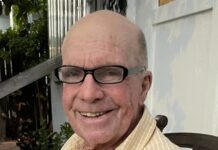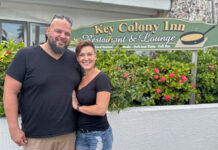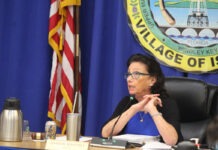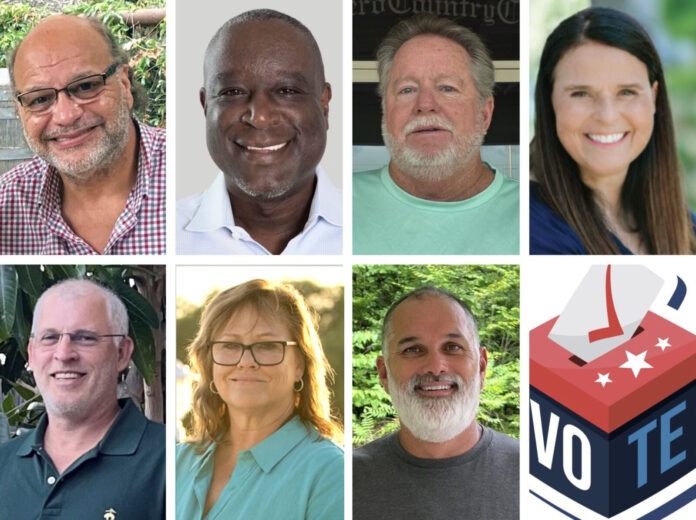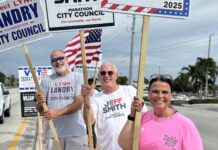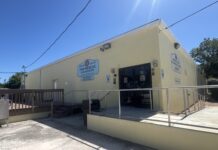Each week, in an effort to provide greater familiarity and communication between the seven Marathon City Council candidates and our readers, the Marathon Weekly has printed candidates’ answers to a series of questions in editions leading up to the Nov. 4 election. Three seats on the council will be filled by the candidates with the highest vote totals, joining council members Kenny Matlock and Lynny Del Gaizo on the dais.
The Keys Weekly will reprint one question from our Oct. 1 forum in the Oct. 23 and 30 issues, along with one new question given to candidates each week. Answers from our forum are direct quotes, trimmed for length. Other answers are printed exactly as submitted by candidates, with responses limited to 150 words.
Forum question: If you were awarded a $5 million grant to use in the city, what would you do with it and why?
New question: Candidates have expressed very different opinions about the future of workforce and/or affordable housing in Marathon. Given the challenges of building in the Keys, with restricted land and building rights and high construction costs, what is your plan to ensure that housing that fits your vision moves forward?

LYNN LANDRY
- Even though we do not have any allocations right now, we need to lobby the state for affordable housing and take that $5 million, add it to our other $4 million and buy property – maybe partner with Habitat for Humanity, who has a great model for homeownership, and that would be a great way to move forward. If you can buy the land, it makes building the houses a little bit easier to do, because construction costs are so out of control. We can build duplexes, triplexes, town homes or even something like that, so that we have homeownership.
- We need all types of affordable housing. Balancing duplex, triplexes and apartments, focusing on workforce housing. There are NO more allocations! I will continue to fight for more to offset the need for real workforce housing. We are the leaders in the county in this area and are the model that is followed by other jurisdictions. I will continue to put our residence first. I don’t have to tell you that there is no “fix” for the problem. I will continue to work hard, think outside the box to achieve the best results possible. Other candidates say we only need single family homes and duplexes. I’m a contractor. With the lack of land and rising cost of land/construction, I would like to see the plan on how to accomplish this in a meaningful way. What happens when Trailerama redevelops? Where will all these hard-working families live in our community?
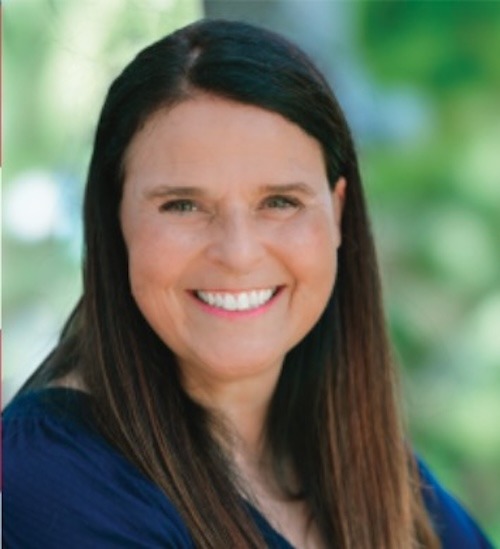
ROBYN STILL
- I think that I would like staff to look at that priority list of our infrastructure, look to see what needs improvements the most right now, and have our grant writer explore grants to put with that money. Let’s go to work on those pieces of infrastructure first, because if we don’t have that in place, if we’re overburdened, no amount of housing that we build is going to matter. We need that infrastructure in place.
- Marathon has limited building allocations remaining. Approving the county’s 19-unit transfer funded by tourist tax dollars was smart — bringing land, allocations, and funding at no taxpayer expense. Every affordable/workforce unit is important, but without allocations, we cannot build ANY affordable/workforce housing. We must proactively work with Monroe County and other Keys municipalities to obtain additional state allocations. If obtained, we can then explore incentives: public-private partnerships, employer-provided housing programs, expedited permitting, and creative financing. Allocations are the key to everything — without allocations there are limited opportunities for the construction of affordable/workforce housing. Obtaining them is one of my top priorities.

GREG ROBINSON
- I would not go for affordable housing, because again, we have $4 million sitting there idle. What I would do is immediately take $10,000 of it and hire an economic consultant to come through, tear down our budget and find me an additional $3 million in bloat. And thenI would take the aggregate of that $8 million and start to invest in drainage. I would also look for a way to pile on from vacation rental revenue to provide more of a sustainable fund so we can continue to invest in our drainage issue, which is not going away.
- Marathon has over $4 million sitting idle in its Affordable Housing Fund, yet our workforce continues to struggle to live here. This is a failure of the current City Council and administration to prioritize results over rhetoric. Those funds were collected to improve housing access, not to sit untouched while Rome burns. My plan puts those dollars to work immediately by pairing them with a modernized vacation rental fee structure that requires higher-earning properties to contribute slightly more. Together, these sources can fund sustainable workforce housing subsidies paid directly to landlords or employers of verified local workers: teachers, police, nurses, and small-business employees, all without raising taxes. It’s fiscally sound, requires no new taxes, and delivers measurable outcomes. As an economist, I know the math works; as a resident, I know Marathon’s future depends on keeping our community livable for the people who make it thrive.
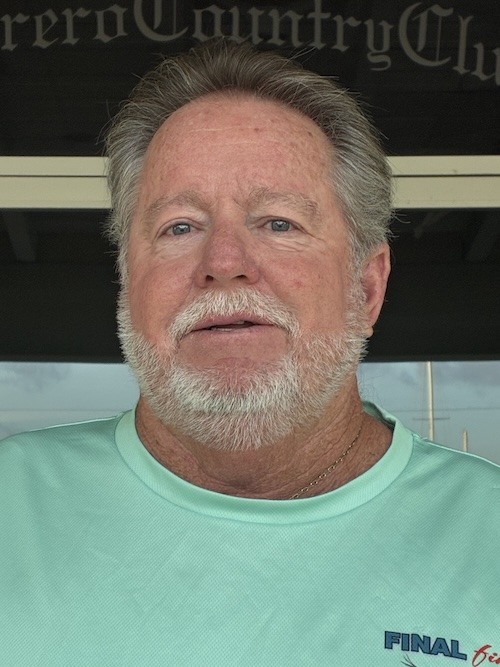
DAVE PERRY
- We have more affordable housing than any other city in Monroe County right now. The problem is, it’s not affordable – a 1/1 for $3,000 a month, do you think a school teacher can do that? They can’t. We worked hard in this city to get good school teachers, and now we have great teachers, but where are they going to live? If we’re going to build affordable housing, get it down to where they can afford it. Let’s help out our community.
- No one has a direct fix for this. It’s a bunch of small decisions that will help the unfixable problem. The argument by our mayor that it’s not financially feasible to build single-family homes and duplexes is absurd. Currently there are about 35 to 40 people standing in line for affordable housing Rights to do just that. Getting the rights to them also remove those lots from takings cases. This will solve two problems at the same time. This plantation mentality of pack the workers in and charge them the max rent they can afford is not the solution. It doesn’t help them towards home ownership. At the same point, we have to acknowledge a dwelling unit is a unit no matter what we call it. The traffic study shows we are built out, and we need to acknowledge that first.
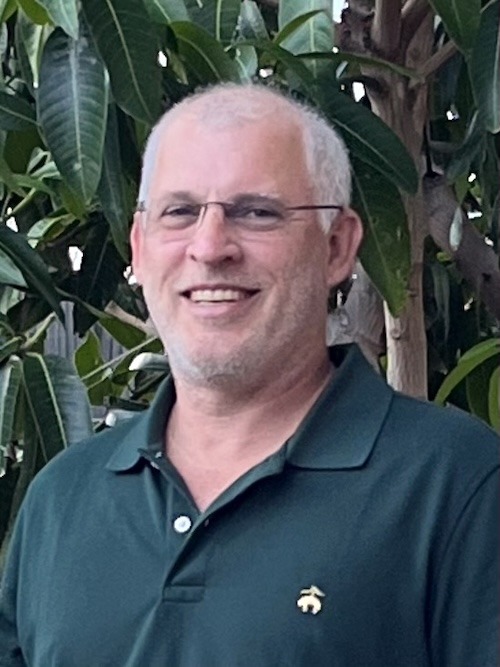
JEFF SMITH
- I think the first thing I would probably do is add it into the affordable housing fund, and then actually look at acquiring property in Marathon that then we could sell for home ownership, retain the land itself, and then get an exponential return on that investment. We can’t build our way out – we have no BPAS units, and if (more) do come, you have one per lot. If we want to have homeownership and our kids being able to stay in the community, the best we can do is try to alleviate the land cost and development costs out of the equation. If I partner that with the $4 million we have, that gives us $9 million and we start basically our own housing authority, which is what Key West has done for years … Their problems with affordable housing are not as pronounced as ours.
- To truly address affordable housing, we need to recognize that the City has very few building rights left. Even if SB180 provided relief, any new rights would be limited — just one home per lot — which isn’t enough to meet our community’s needs. That’s why we should take advantage of every opportunity to secure building rights and create more housing for local residents. At the same time, because new construction is so limited, we should explore using our affordable housing funds to support a community land trust. This would help lower the cost of land and give more people a chance at homeownership. We also have $4 million in our affordable housing fund that could be used to buy existing homes, place deed restrictions on them, and make them available to qualifying community members.

GERRIT HALE
- The big problem with housing and affordable workforce housing in the Keys, and especially Marathon, is the availability of land. Any land that could be acquired and put into the stock made available for workforce housing, I think that would be a great use of that money. Also, looking at ways of getting some permanent monitoring and testing of the waters around the area, making sure we keep the beaches clean and safe for our kids.
- My all-in approach to workforce housing tackles the Keys’ toughest obstacles — limited land, high costs, scarce BPAs, and restrictive ROGOs — through innovation and collaboration. With developable land nearly exhausted and ROGO allocations tightly controlled, traditional methods won’t work. I propose creating a dedicated non-profit housing entity to acquire, assemble, and manage land specifically for workforce housing. This organization would leverage public-private partnerships, state and federal grants, and donated or city-owned parcels to build and maintain truly affordable units. By reinvesting all proceeds locally and prioritizing housing for essential workers, we can bypass profit-driven pressures and focus on long-term affordability and community stability.

DEBBIE STRUYF
- I would take it and split it between (Jeff and Robyn’s answers). Put it into workforce housing, fix our infrastructure, and keep the locals here in town.
- The current model of affordable housing in Marathon isn’t answering the true need of our community. While units exist, they are open to all of Monroe County, rather than prioritizing them for those who live and work in Marathon. What I feel we need is to move beyond the rental model, and promote a pathway to ownership. Maybe a townhouse or duplex community for Marathon, as apposed to these large cluster builds open to the county. This will help maintain the density required to keep from overloading the infrastructure that we have in place, and also maintain the small-town character of Marathon. Building could be achieved with federal and state grants, as well as some private and/or public partnership. Marathon needs housing that services its workforce, and this model promotes that, and is about stability, growth and dignity.
